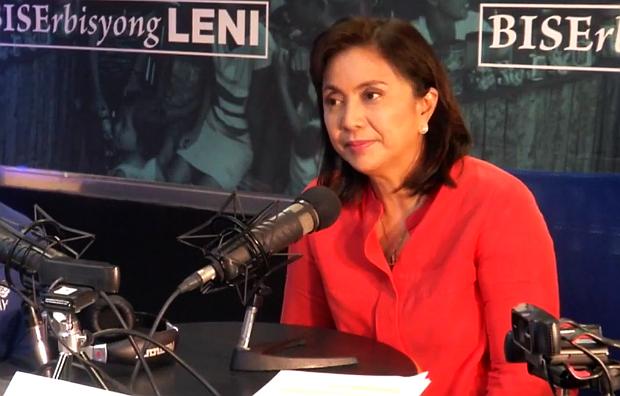Robredo: Rice tariffication law should have safety nets for farmers

Credit to Author: Alexander Magno| Date: Sun, 17 Feb 2019 15:17:05 +0000
MANILA, Philippines — Vice President Leni Robredo urged the Duterte administration to ensure that there would be measures to safeguard rice farmers from the negative effects of the recently signed rice tariffication law.
“Maaapektuhan talaga iyong mga magsasaka. Kaya iyong pinakatanong sa batas: Ano ba iyong safety nets? Kung gagawin natin ito, ano ba iyong safety nets natin para siguruhin na hindi negatibo iyong epekto sa mga magsasaka? Kasi sigurado mayroon,” Robredo said on Sunday in “BISErbisyong Leni,” her weekly radio show aired over AM station DZXL.
[The farmers will really be affected. So the question about the law is: What are the safety nets? If we’re going to implement this, what are the safety nets to ensure there won’t be negative effects on the farmers? Certainly, there will be those effects.]
She also expressed fear that the law signed recently by President Rodrigo Duterte would be similar to the Tax Reform for Acceleration and Inclusion (TRAIN) Act — in the sense that government response to aid affected families were slow.
“Iyong nakakatakot lang dito, kung gagawin natin na test run iyong nangyari sa TRAIN law, na napakabagal noong pag-implement ng mga safety nets para sa mga mahihirap, talagang maghihirap pang lalo iyong mga magsasaka,” the Vice President said.
[What’s bothersome about this, if we take as a test run what happened to the TRAIN law, where the safety nets for the poor were very slowly implemented, the farmers will suffer all the more.]
READ: Duterte signs rice tariffication bill into law
The issues stemmed from discussions on whether the government should suspend the TRAIN Act, after the monthly inflation rates for 2018 skyrocketed to as high as 6.7 percent in September and October — the highest in nine years since the 7.2 percent recorded in February 2009.
READ:
Inflation hits new over 9-year high of 6.7% in September on elevated food prices
Duterte rejects calls to suspend TRAIN law
Robredo said that the rice tariffication law, which allows the importation of rice from other countries, would affect local farmers as rice dealers may opt to purchase cheaper supplies.
[BISErbisyong LENI – Episode 93]In today’s episode, senatorial bet Florin “Pilo” Hilbay who is running under the #OtsoDiretso senatorial slate, joins Vice President Leni Robredo and Ka Ely Saludar in discussing issues relevant to our nation today. This includes the controversial arrest of Rappler CEO Maria Ressa, the Rice Tarriffication Act, and the results of the most recent Pulse Asia survey.Today’s #IstoryaNgPagasa guests are Eldrich Marquez and Nikki Dolfo from Ateneo de Manila University whose organization, Baybayin Ateneo,encourages discourse on Filipino culture and identity. Sigla: Ateneo Cultural Convention, their flagship project this year, aims to introduce to Ateneans the significance of Bangsamoro cultural heritage, educate them about the history and challenges of the Bangsamoro people and advocate for the inclusion of Mindanaoan studies and Peace Education in the general core curriculum of the university.Learn more about their project and stay updated with VP Leni’s activities by tuning in to RMN-DZXL 558 kHz or watching live here on Facebook every Sunday at 9am for BISErbisyong Leni. Contact Biserbisyong Leni at 09088985364 or 09158985364.
由 VP Leni Robredo 发布于 2019年2月16日周六
“Sigurado na mababawasan iyong kita [ng mga magsasaka]. Kaya crucial dito sa usapin ano iyong gagawin para hindi maapektuhan nang masama iyong mga magsasaka,” she explained.
[The farmers’ earnings will surely be reduced. So it’s crucial to determine what could be done to prevent farmers from being affected.]
However, she also admitted that there could be good effects, especially for consumers who seek lower prices of grains.
Still, she urged the government to look for a win-win situation for both farmers and consumers.
“Iyong isa namang mukha nito, para sa mga consumers. Iyong, parang promise dito, kapag nangyari na itong rice tariffication, mas bababa iyong presyo ng bigas,” Robredo said.“Kung gagawin natin ito para sa mga consumers, gagawin natin ito kasi gusto natin na bumaba iyong presyo ng bigas. [Pero] paano natin ipo-protect iyong ating mga magsasaka?”
[On the other hand, as far as consumers are concerned, if rice tariffication is implemented, it will bring down prices. If we implement this, we are doing it to bring down the price of rice. But how can we protect the farmers?]
Government officials supportive of the law said that the measure would help increase the capabilities of farmers, as the tariff or revenue would go to the Rice Fund, which would then be used to purchase equipment and machinery.
Labor unions claim, however, that the law is a death sentence for farmers, as local grains will not be able to compete with imported lower-priced grains. /atm